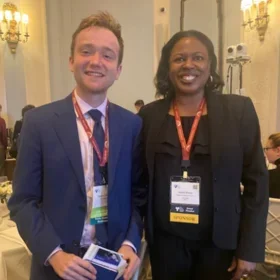As the demand to fuel highly contested races rises, so does the need for political analytics professionals.
By Jennifer Ha
The intense dogfight for control of the Senate and the House of Representatives fueled record spending in the 2022 midterms. Senator Rafael Warnock (D-Ga.) defeated his Republican challenger, ex-football star Herschel Walker, in a much-watched, highly contested runoff on December 6. According to Federal Election Commission (FEC) data, Warnock raised $175,692,201.28 to Walker’s $58,697,140.18. The last Senate campaign approaching that amount in the war chest was also in Georgia—in the 2020 midterms. This unprecedented growth in campaign funding and spending highlights a much larger trend in politics—and the need for more of the same: a new generation of political analysts to drive funding efforts.
To navigate this new reality—and as the demand continues to grow in campaigns for more aggressive fundraising—the need for political experts fluent in both politics and analytics to guide these efforts has also increased exponentially. To train these professionals, the Columbia University M.S. in Political Analytics program provides students and industry professionals wishing to advance their knowledge and skills with a comprehensive program equipping them for success. “While analytics and data-driven decision-making are playing an ever larger role in modern politics, there are very few academic programs that prepare individuals to excel at these tasks,” said Professor of Political Science Greg Wawro, the program’s founder and leader. “One of the key goals of this program is to narrow the gap between substantive political professionals and those involved on the technical, analytic side.”
This need is highly evident as more and more money pours into Georgia—and into other campaigns. In the past 20 years, spending on federal and state campaigns—along with ballot initiatives—has hit record numbers each campaign cycle. According to FEC data, it’s not uncommon for spending in a U.S. Senate race to exceed $100 million, and statewide initiative campaigns regularly exceed that amount. In 2022, the total cost of federal and state election spending is expected to exceed $16.7 billion, according to opensecrets.org. Spending on the 2024 presidential race will likely exceed $10 billion alone, with additional spending up and down the ballot.
There are multiple reasons for this, including the 2010 Supreme Court decision in Citizens United that ruled 5–4 that laws that prevent corporations and unions from using their general treasury funds for independent “electioneering communications” violated their First Amendment guarantee of freedom of speech. And following the Citizens ruling, in the 2010 case Speechnow.org v. FEC, a federal appeals court ruled that outside groups can accept unlimited contributions from both individual donors and corporations provided they do not give directly to candidates. This translated to allowing unlimited outside spending and drove the rise of Political Action Committees (PACs) and even Super-PACs. Also critical has been the rise of small-dollar donors, which (through analytics-driven fundraising approaches) powers a multibillion-dollar industry that funds campaigns from state Senate races all the way up the line to the presidency.
What does this mean for somebody interested in political analytics? Plenty. Within the fundraising world, data-driven strategies have been key to building successful fundraising efforts. From experimental design of fundraising emails to targeting potential audiences and donors in states even outside of key races and beyond, analytics is at the core of this work, and so the demand for political analytics professionals is rising. Said Dr. Doug Usher, partner at Forbes Tate Partners, “The timing couldn’t be better for the launch of the Columbia M.S. in Political Analytics program. As more campaigns understand the power of having analysts with the cutting-edge skills to drive funding strategies, they will need professionals with this training who can hit the ground running.”
For larger, institutional, and “dark money” spending, data-driven approaches to spending that money are central. Large-dollar donors want their spending to be impactful, and they look to analytics to demonstrate how their political spending is making a difference in elections and advocacy efforts. Increased spending combined with a growing demand for data-driven accountability has increased the demand for those with strong training in political analytics.
Under expert faculty drawn from across the University, students undertake a rigorous suite of tailored political science and applied quantitative analytics, and learn new approaches to data analytics, including machine learning and AI. Taken together, these courses help develop the skills students need to model and analyze the activities, actions, and behavior that are fundamental to politics, which in turn prepare them to develop insights and strategies to understand, explain, and influence political action. The program’s curriculum requires that students complete thirty-six credits, which include a set of core courses, selective courses, and a capstone, all building toward a comprehensive understanding of the foundational, theoretical, analytical, and applied skills needed for professional data-oriented careers in politics. The program offers both full-time and part-time options. Full-time students are expected to complete the degree in three semesters. The part-time option provides flexibility for working professionals, and study must be completed in six semesters. Core courses are offered in seven-week modules, taught online, to provide flexibility for working professionals.
Learn more about the new Columbia University M.S. in Political Analytics program. Application priority deadline: February 15, 2023. The final application deadline is June 15, 2023. The 36-point credit program is available part-time and full-time.
For general information and admissions questions, please call 212-854-9666 or email politicalanalytics [[at]] sps [[dot]] columbia [[dot]] edu.


